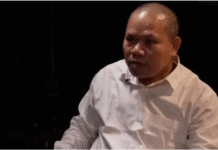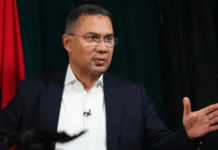New Zealand has shared intelligence material on terrorists collected through covert surveillance with Bangladesh, the New Zealand Herald reported on Thursday following secret documents.
The documents shine light on the major role played by the Government Communications Security Bureau (GCSB) in electronic spying operations conducted in the small South Asian nation, says the newspaper.

The New Zealand Herald analysed the documents in collaboration with US news website The Intercept, which obtained them from the NSA whistle-blower Edward Snowden.
According to the report of the New Zealand Herald, the surveillance has been used to aid the United States as part of its global counter-terrorism campaign, launched after the September 11 attacks in 2001.
The Bangladesh spying is revealed in an April 2013 US National Security Agency (NSA) report about its relationship with New Zealand.
In a section called “What Partner Provides to NSA”, it says “GCSB has been the lead for the intelligence community on the Bangladesh CT [Counter-Terrorism] target since 2004.”
The GCSB provides “one of the key SIGINT [signals intelligence] sources of [Bangladesh counter-terrorism] reporting to the US intelligence community.”
The intelligence gathered by the GCSB staff was also being forwarded to foreign intelligence agencies, including Bangladesh’s state intelligence agency.
The New Zealand Herald says, in recent years, human rights groups have issued several reports documenting Bangladeshi intelligence and security agencies’ disregard for international prohibitions on torture and alleged involvement in politically motivated killings.
In 2014, a case was filed in the International Criminal Court accusing the Bangladesh Government of committing crimes against humanity, according to the report.
The report says the GCSB’s surveillance operations in Bangladesh are among the most surprising and obscure yet revealed as Bangladesh barely registers in New Zealand foreign policy.
The Ministry of Foreign Affairs and Trade website says: “Relations between New Zealand and Bangladesh remain friendly, although interaction is limited.”
Nonetheless, a New Zealand government source told the Herald that Bangladesh is the main focus of one of the GCSB’s four analysis sections, called ICT, and has been for over a decade.
ICT, the Transnational Issues section, was set up in April 2002 in the wake of the September 11 attacks to focus on terrorism threats.
The Bangladesh project appears to have begun in 2003, under Prime Minister Helen Clark, at a time when her government was receptive to US war-on-terror requests following refusal to join the invasion of Iraq.
The “NSA Relationship with New Zealand” document gives the starting date as 2004.
But a NSA officer wrote a briefing paper about the GCSB in December 2003 that noted the GCSB was “contributing to the War on Terrorism by reporting on the activities of Islamic extremists in Asia and the Pacific region and specifically taking on Bangladesh and Burma.”
Another intelligence document from 2009 gives detail on how the Bangladesh spying occurs.
The document states that staff within a GCSB unit named “OCR”, the Signals Intelligence Development Team, are involved in planning the surveillance.
It appears the GCSB does not directly conduct the interception and instead uses surveillance equipment provided by an allied agency.
The 2009 document reveals that there is a special collection site in the Bangladesh capital, Dhaka, for eavesdropping on local communications.
New Zealand does not have a high commission or any other official building in Bangladesh in which to hide a covert listening post.
According to the New Zealand Herald, the Snowden documents suggest the Dhaka unit may be located inside a US-controlled building with operations overseen by the NSA and the Central Intelligence Agency (CIA).
The 2009 report said that “Internal GSM [mobile phone] collection is continuing with the extension of the Dhaka F6 environment survey.”
F6 is a designator used to refer to a joint CIA/NSA unit known as the Special Collection Service, which eavesdrops on communications from US embassies and consulates.
The report said the covert listening post was mostly being used by the GCSB to intercept mobile phone calls – “site collection resources are in the main being used for the collection of productive GSM emitters”.
Green Party co-leader Russel Norman said the spy agency was “dragging” New Zealand into human rights abuses, and the Government should stop providing intelligence assistance to Bangladesh.
“All three key anti-terrorism government agencies in Bangladesh have been implicated in horrendous human rights abuses, so it is impossible to guarantee that the information passed on did not lead to innocent people being killed or tortured,” Dr Norman said.
“John Key has always justified the GCSB on the basis that it is there to protect the good guys, but these documents reveal that it is helping the bad guys.
“Most New Zealanders would find this deplorable and agree that this is not within the mandate of the GCSB.”
The intelligence gathered by the GCSB staff was being forwarded to foreign intelligence agencies.
The April 2013 NSA report said the “GCSB’s Bangladesh CT [counter terrorism] reporting provided unique intelligence leads that have enabled successful CT operations by Bangladesh State Intelligence Service, CIA and India over the past year”.
Bangladesh has several agencies that focus on gathering intelligence, primarily including the Directorate General of Forces Intelligence (DGFI), the National Security Intelligence agency (NSI), and the police Special Branch.
Bangladesh has low levels of terrorist activity compared with many countries in that region, is remote from New Zealand and there is no suggestion that the GCSB work was in response to any direct threat to New Zealand.
Source: Dhaka Tribune









